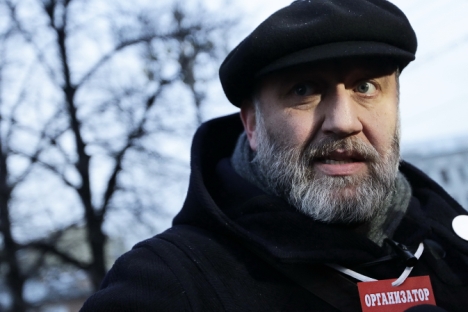
Sergei Parkhomenko, member of the Coordinating Council, proposed to mark the anniversary of last winter’s protests. Source: ITAR-TASS
The Coordinating Council of the Russian opposition is discussing the possibility of holding a large rally during the first week of December, according to journalist, publicist and member of the Coordinating Council, Sergei Parkhomenko. In a message posted on his Facebook page last week, Parkhomenko announced that he “sent all members of the Coordinating Council a letter with a collective proposal on how to mark the anniversary of last winter’s protests.”
The proposal was initiated by a “group of citizens” (as Parkhomenko calls them) which includes nine people: Sergei Parkhomenko, writer and publicist Dmitry Bykov, TV personality Ksenia Sobchak, doctor of biology Mikhail Gelfand, TV hosts Mikhail Shats and Tatyana Lazareva, journalist Filip Dzyadko, blogger Rustem Adagamov and film director Vladimir Mirzoev.
The letter suggested that an agenda be formulated for December so that activities can begin as soon as possible. Some of the issues on the proposed agenda are: whether to fix the date of the event on Dec. 8 or Dec. 9, the latter of which is St. George’s Day; and whether or not the format of the event should be rallies and speeches or a demonstration with a submission of signatures, as Parkhomenko proposes.
The initiators and organizers were also instructed to have the Coordinating Council officially registered, and a group of petitioners will file an application with the Moscow Town Hall.
“The objective of the demonstration is to collect 100,000 votes to support simple and understandable political demands. This is the political initiative of 100,000 people that Putin said is needed in order to be considered a legislative initiative by the State Duma,” Parkhomenko wrote.
Each participant in the St. George’s Day event has been advised to come with a signed printout of the initiative and to hand it over to volunteers when joining the demonstration. At the very least, the event organizers want to ensure that the people have the power to choose the government or even change it. This means re-introducing four-year terms for the president and the State Duma and abolishing Article 5 of the Federal Law on Referendums, which bans bringing any politically significant issues up for vote.
The event also aims to meet the demand of the public, which wants the opposition to “pass from words to deeds.”
Parkhomenko notes that the final decision concerning the date for the event will be made by the Coordinating Council during its next meeting on Nov. 24; interestingly, the members of the Council are supposed to vote on all decisions in person. Summing up his thoughts about the December event, Parkhomenko said: “This will be a major political campaign designed to gradually shape the political agenda for the opposition and expand the range of its supporters.”
A recent poll conducted by Public Opinion Foundation shows that almost a quarter of Russians (24 percent) are aware or have heard of the opposition’s Coordinating Council. Of these people, 35 percent believe that the Council will not become an influential political power, compared to just 8 percent that think it will (57 percent were undecided).
Importantly, the majority of people that think the Coordinating Council will turn into a serious political power are those respondents ready to participate in protests ‒ young people with university degrees and those who support Mikhail Prokhorov and the political party A Just Russia. These respondents insist on several things about the opposition Council: the authorities need an opposition; the Council has been formed for a good reason and authorities will have to reckon with it; the Council will voice the opinion of a significant part of society, and it comprises decent, influential and active people with new ideas.
Muscovites, those who make more than 20,000 rubles ($640) per month, inhabitants of cities with a population of 250,000–1,000,000 and middle-aged university-educated people appear to be skeptical about the future of the Council. They believe that authorities will not allow the Coordinating Council to become influential ‒ that “people on the Council do not have any credibility; they are unknown and have no support.” They also believe that there is no unity within the Council: “its members don’t share any common values” and “the Council is financed with Western money.”
In general, 21 percent of Russians polled by Public Opinion Foundation want the Coordinating Council to become a real political force, while 34 percent do not. Most of those who want the Council to gain influence are young people with university degrees and those who support Prokhorov, whereas those living in Moscow and other highly populated cities have no such wish.
The respondents were also asked their opinions of the 20 members of the Coordinating Council who received most of the votes during the elections to the self-governing body.
The three leading members of the Council are TV host Tatyana Lazareva (31 percent of the respondents like her, 8 percent dislike her, and 37 percent do not know who she is), chess player and leader of the United Civil Front, Garry Kasparov (28 percent like, 13 percent dislike, and 28 percent do not know) and TV host Mikhail Shats (18 percent like, 8 percent dislike, and 52 percent do not know).
TV personality Ksenia Sobchak is the most well-known member of the Council – only 11 percent of the Russians do not know her. However, 49 percent of the respondents dislike her, more than any other Council member (only 16 percent like her). Seven percent of respondents like Sergei Udaltsov and Aleksei Navalny. Udaltsov is disliked by 21 percent of Russians, and 52 percent of them do not know who he is, while 16 percent of the respondents dislike Navalny and 55 percent of the Russians do not know who he is.
First publihsed in Russian in the Expert magazine.
All rights reserved by Rossiyskaya Gazeta.
Subscribe
to our newsletter!
Get the week's best stories straight to your inbox